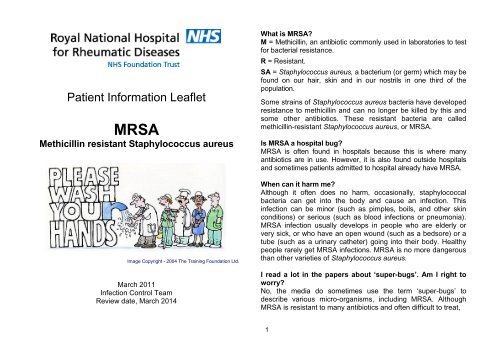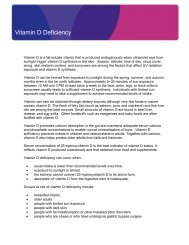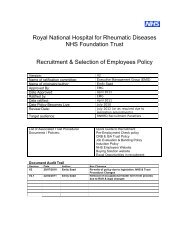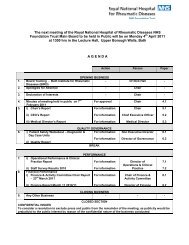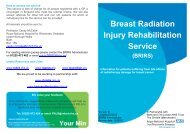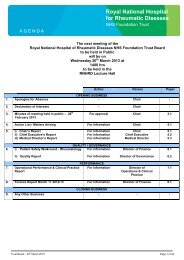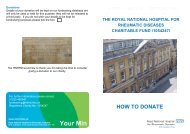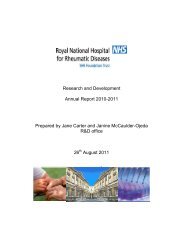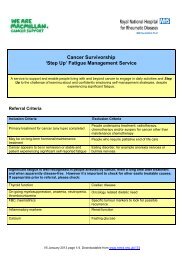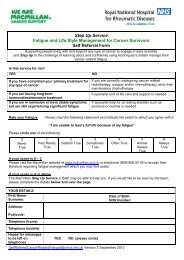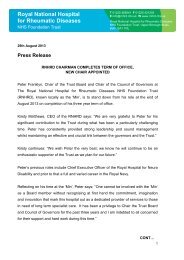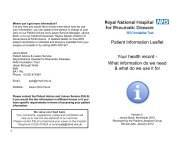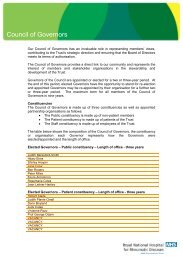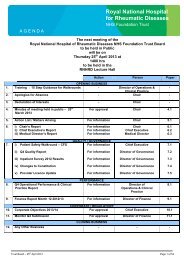MRSA Patient Information Leaflet - Royal National Hospital for ...
MRSA Patient Information Leaflet - Royal National Hospital for ...
MRSA Patient Information Leaflet - Royal National Hospital for ...
You also want an ePaper? Increase the reach of your titles
YUMPU automatically turns print PDFs into web optimized ePapers that Google loves.
<strong>Patient</strong> <strong>In<strong>for</strong>mation</strong> <strong>Leaflet</strong><br />
<strong>MRSA</strong><br />
Methicillin resistant Staphylococcus aureus<br />
Image Copyright - 2004 The Training Foundation Ltd.<br />
March 2011<br />
Infection Control Team<br />
Review date, March 2014<br />
What is <strong>MRSA</strong>?<br />
M = Methicillin, an antibiotic commonly used in laboratories to test<br />
<strong>for</strong> bacterial resistance.<br />
R = Resistant.<br />
SA = Staphylococcus aureus, a bacterium (or germ) which may be<br />
found on our hair, skin and in our nostrils in one third of the<br />
population.<br />
Some strains of Staphylococcus aureus bacteria have developed<br />
resistance to methicillin and can no longer be killed by this and<br />
some other antibiotics. These resistant bacteria are called<br />
methicillin-resistant Staphylococcus aureus, or <strong>MRSA</strong>.<br />
Is <strong>MRSA</strong> a hospital bug?<br />
<strong>MRSA</strong> is often found in hospitals because this is where many<br />
antibiotics are in use. However, it is also found outside hospitals<br />
and sometimes patients admitted to hospital already have <strong>MRSA</strong>.<br />
When can it harm me?<br />
Although it often does no harm, occasionally, staphylococcal<br />
bacteria can get into the body and cause an infection. This<br />
infection can be minor (such as pimples, boils, and other skin<br />
conditions) or serious (such as blood infections or pneumonia).<br />
<strong>MRSA</strong> infection usually develops in people who are elderly or<br />
very sick, or who have an open wound (such as a bedsore) or a<br />
tube (such as a urinary catheter) going into their body. Healthy<br />
people rarely get <strong>MRSA</strong> infections. <strong>MRSA</strong> is no more dangerous<br />
than other varieties of Staphylococcus aureus.<br />
I read a lot in the papers about ‘super-bugs’. Am I right to<br />
worry?<br />
No, the media do sometimes use the term ‘super-bugs’ to<br />
describe various micro-organisms, including <strong>MRSA</strong>. Although<br />
<strong>MRSA</strong> is resistant to many antibiotics and often difficult to treat,<br />
1
antibiotics can still successfully cure most <strong>MRSA</strong> infections.<br />
<strong>Patient</strong>s who are only colonised (see below) with <strong>MRSA</strong> usually<br />
do not need antibiotic treatment. <strong>MRSA</strong> is not the same as the<br />
“flesh eating bug” that is sometimes mentioned in the media.<br />
Please note that the RNHRD has an excellent track record in<br />
infection control and prevention and has some of the lowest rates<br />
of <strong>MRSA</strong> in the country. We appreciate your assistance in<br />
helping us to maintain these high standards.<br />
What is the difference between colonisation and infection?<br />
Colonisation means that <strong>MRSA</strong> is present on or in the body<br />
without causing illness. Infection means that <strong>MRSA</strong> is causing a<br />
medical problem. Sometimes colonised patients can go on to<br />
develop <strong>MRSA</strong> infection, especially if they are very sick or have<br />
weak immune systems.<br />
Can <strong>MRSA</strong> spread?<br />
Yes. Like any infection <strong>MRSA</strong> can spread among other patients,<br />
who are often very sick with weak immune systems that may not<br />
be able to fight off infections. <strong>MRSA</strong> is usually spread by physical<br />
contact. <strong>Hospital</strong>s take special steps to prevent the spread of<br />
<strong>MRSA</strong> from patient to patient. One of these steps may be to<br />
separate, or isolate, a patient with <strong>MRSA</strong> from other patients.<br />
Risk assessments are made and the risk will vary from ward to<br />
ward and from patient to patient.<br />
Screening <strong>for</strong> <strong>MRSA</strong> be<strong>for</strong>e your treatment at the RNHRD.<br />
To help in the fight against hospital acquired infections it is now a<br />
requirement by the Department of Health <strong>for</strong> all hospitals to<br />
screen every patient <strong>for</strong> <strong>MRSA</strong> be<strong>for</strong>e they are either admitted,<br />
or come to hospital <strong>for</strong> a day-case appointment. The screening<br />
process is simple and painless and will be carried out either at<br />
your GP surgery, or by a nurse in the outpatient department at<br />
the hospital where you are being treated. It will be made clear to<br />
you prior to your treatment where and when you will be<br />
screened. On confirmation of a clear result treatment at the<br />
hospital will begin as planned. Should your result come back<br />
positive you will be given treatment to clear the <strong>MRSA</strong>. Please<br />
note that if your treatment is an emergency you will come straight<br />
to the hospital and will be screened by a nurse on admission.<br />
What happens if you have <strong>MRSA</strong>?<br />
‣ Staff who touch your wound or have close contact (such as<br />
lifting) will wear an apron and gloves to prevent them<br />
carrying the germ to other patients.<br />
‣ You should still be able to get the daily papers, use the<br />
radio and maybe the television. Please see the nurses.<br />
‣ Do not leave your room or bay unnecessarily but this should<br />
not stop you having surgery, physiotherapy or home visits if<br />
you need them.<br />
‣ You can use your own toiletries, e.g., makeup and creams.<br />
Personal clothing does not need any special treatment.<br />
Getting Rid of <strong>MRSA</strong><br />
You may be asked to use some topical treatments to help get rid of<br />
<strong>MRSA</strong>. Usually the following treatments are prescribed <strong>for</strong> five<br />
days:<br />
‣ A daily wash or bath in a medicated lotion (Skinsan). For<br />
Skinsan solution to be effective it needs to be applied neat<br />
to wet skin and rubbed all over the body <strong>for</strong> about a minute.<br />
If possible your hair should also be washed with Skinsan.<br />
Ideally you should use a clean towel to dry yourself and put<br />
clean clothes on afterwards.<br />
‣ You will also be asked to put a medicated talcum powder,<br />
such as CX powder, under your arms and around your<br />
groins after your wash.<br />
Because <strong>MRSA</strong> is often found in the nose you will also have an<br />
antibiotic ointment (Bactroban Nasal Ointment) to apply to your<br />
nostrils three times a day. Place a small amount of the ointment<br />
about the size of a match head on the little finger and apply it to<br />
the inside of each nostril.<br />
2 3
Close the nostrils by pressing the sides of the nose together;<br />
this will help spread out the ointment. You could use a cotton<br />
bud instead of the little finger <strong>for</strong> the application.<br />
Please mention if you have dry or sensitive skin, are pregnant or<br />
are breastfeeding as sometimes different treatments will be more<br />
appropriate <strong>for</strong> you. In rare cases you may also need further<br />
antibiotic treatment in the <strong>for</strong>m of tablets or injections.<br />
Is it safe to be in the same room as a person with <strong>MRSA</strong>?<br />
Healthy people are at very little risk of being affected by <strong>MRSA</strong>. It<br />
is safe <strong>for</strong> healthy family members or other visitors to be in the<br />
same room with a person with <strong>MRSA</strong>. Physical contact, such as<br />
touching or hugging, is okay. There is a very small risk that those<br />
who are well may carry <strong>MRSA</strong>. There<strong>for</strong>e all staff and visitors to<br />
your room should use alcohol hand rub or wash their hands<br />
thoroughly be<strong>for</strong>e entering and leaving. Any open wounds or cuts<br />
should be covered with a plaster. Alcohol hand rub is provided<br />
outside patient rooms and on the wards to clean the hands.<br />
People who are very ill or who have weak immune systems<br />
should avoid handling the body substances of a person with<br />
<strong>MRSA</strong> and should limit their physical contact to no more than<br />
casual touching. They should also wash their hands after<br />
physical contact with a person with <strong>MRSA</strong>.<br />
Can my children get <strong>MRSA</strong> by being around a person with<br />
<strong>MRSA</strong>?<br />
Healthy people, including children and pregnant women, are at<br />
very little risk of getting infected with <strong>MRSA</strong>.<br />
Can <strong>MRSA</strong> affect future admissions or any planned future<br />
operations?<br />
If you are readmitted to hospital, swabs will be taken to see if the<br />
<strong>MRSA</strong> is still present. Once clear, treatment will commence as<br />
appropriate.<br />
4<br />
Will it affect my discharge?<br />
No it will not. As soon as you are well enough, you can be<br />
discharged to your own home or to a nursing or residential home<br />
without any further treatment or delay. If you have commenced<br />
the <strong>MRSA</strong> treatments please carry on until the 5 day course is<br />
completed and then stop. If you are at home you can socialise<br />
and shop etc. as usual.<br />
Where can I find further in<strong>for</strong>mation on <strong>MRSA</strong>?<br />
Further detailed in<strong>for</strong>mation on <strong>MRSA</strong> is available on the Public<br />
Health Laboratory Service Web Site.<br />
http://www.phls.org.uk/topics_az/staphylo/menu.htm<br />
If you require further in<strong>for</strong>mation specifically on your <strong>MRSA</strong> and its<br />
treatment please ask your healthcare team.<br />
Infection Control Team can be contacted at<br />
<strong>Royal</strong> <strong>National</strong> <strong>Hospital</strong> <strong>for</strong> Rheumatic Diseases<br />
Upper Borough Walls<br />
Bath<br />
BA1 1RL<br />
Tel: 01225 465941<br />
Please contact the <strong>Patient</strong> Advice and Liaison Service (PALS) on<br />
01225 473424 if you would like this in<strong>for</strong>mation in different <strong>for</strong>mat.<br />
We value your feedback.<br />
Your comments, suggestions, praise and complaints will<br />
help us to improve the standard of our services.<br />
Please contact PALS to feedback your views on the hospital<br />
Tel: 01225 473424 or email PALS@rnhrd.nhs.uk<br />
5


